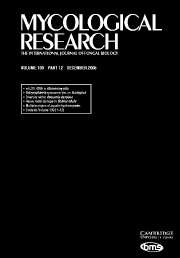Crossref Citations
This article has been cited by the following publications. This list is generated based on data provided by
Crossref.
Esslinger, Theodore L.
2004.
Recent Literature on Lichens—195*.
The Bryologist,
Vol. 107,
Issue. 4,
p.
566.
Boustie, Joël
and
Grube, Martin
2005.
Lichens—a promising source of bioactive secondary metabolites.
Plant Genetic Resources,
Vol. 3,
Issue. 2,
p.
273.
Grube, Martin
and
Blaha, Juliane
2005.
Adaptation to Life at High Salt Concentrations in Archaea, Bacteria, and Eukarya.
Vol. 9,
Issue. ,
p.
471.
Schmitt, Imke
Martín, María P.
Kautz, Stefanie
and
Lumbsch, H. Thorsten
2005.
Diversity of non-reducing polyketide synthase genes in the Pertusariales (lichenized Ascomycota): A phylogenetic perspective.
Phytochemistry,
Vol. 66,
Issue. 11,
p.
1241.
Blanco, Oscar
Crespo, Ana
Ree, Richard H.
and
Lumbsch, H. Thorsten
2006.
Major clades of parmelioid lichens (Parmeliaceae, Ascomycota) and the evolution of their morphological and chemical diversity.
Molecular Phylogenetics and Evolution,
Vol. 39,
Issue. 1,
p.
52.
Schümann, Julia
and
Hertweck, Christian
2006.
Advances in cloning, functional analysis and heterologous expression of fungal polyketide synthase genes.
Journal of Biotechnology,
Vol. 124,
Issue. 4,
p.
690.
Blaha, Juliane
and
Grube, Martin
2007.
The new speciesLecanora bicinctoidea, its position and considerations about phenotypic evolution in theLecanora rupicolagroup.
Mycologia,
Vol. 99,
Issue. 1,
p.
50.
Muggia, Lucia
Schmitt, Imke
and
Grube, Martin
2008.
Purifying selection is a prevailing motif in the evolution of ketoacyl synthase domains of polyketide synthases from lichenized fungi.
Mycological Research,
Vol. 112,
Issue. 2,
p.
277.
Stocker-Wörgötter, Elfie
2008.
Metabolic diversity of lichen-forming ascomycetous fungi: culturing, polyketide and shikimatemetabolite production, and PKS genes.
Nat. Prod. Rep.,
Vol. 25,
Issue. 1,
p.
188.
Schmitt, Imke
Kautz, Stefanie
and
Lumbsch, H. Thorsten
2008.
6-MSAS-like polyketide synthase genes occur in lichenized ascomycetes.
Mycological Research,
Vol. 112,
Issue. 2,
p.
289.
Chooi, Yit-Heng
Stalker, David M.
Davis, Meryl A.
Fujii, Isao
Elix, John A.
Louwhoff, Simone H.J.J.
and
Lawrie, Ann C.
2008.
Cloning and sequence characterization of a non-reducing polyketide synthase gene from the lichen Xanthoparmelia semiviridis.
Mycological Research,
Vol. 112,
Issue. 2,
p.
147.
Valarmathi, R.
Hariharan, G.N.
Venkataraman, Gayatri
and
Parida, Ajay
2009.
Characterization of a non-reducing polyketide synthase gene from lichen Dirinaria applanata.
Phytochemistry,
Vol. 70,
Issue. 6,
p.
721.
Schuemann, Julia
and
Hertweck, Christian
2009.
Physiology and Genetics.
p.
331.
Nelsen, Matthew P.
and
Gargas, Andrea
2009.
Assessing clonality and chemotype monophyly in Thamnolia (Icmadophilaceae).
The Bryologist,
Vol. 112,
Issue. 1,
p.
42.
Schroeckh, Volker
Scherlach, Kirstin
Nützmann, Hans-Wilhelm
Shelest, Ekaterina
Schmidt-Heck, Wolfgang
Schuemann, Julia
Martin, Karin
Hertweck, Christian
and
Brakhage, Axel A.
2009.
Intimate bacterial–fungal interaction triggers biosynthesis of archetypal polyketides in
Aspergillus nidulans
.
Proceedings of the National Academy of Sciences,
Vol. 106,
Issue. 34,
p.
14558.
Schmitt, Imke
Lumbsch, H. Thorsten
and
Yu, Jae-Hyuk
2009.
Ancient Horizontal Gene Transfer from Bacteria Enhances Biosynthetic Capabilities of Fungi.
PLoS ONE,
Vol. 4,
Issue. 2,
p.
e4437.
Kellner, Harald
and
Zak, Donald R.
2009.
Detection of expressed fungal Type I polyketide synthase genes in a forest soil.
Soil Biology and Biochemistry,
Vol. 41,
Issue. 6,
p.
1344.
Honegger, Rosmarie
2009.
The Mycota.
Vol. 5,
Issue. ,
p.
307.
Nelsen, M.P.
Lücking, R.
Grube, M.
Mbatchou, J.S.
Muggia, L.
Plata, E. Rivas
and
Lumbsch, H.T.
2009.
Unravelling the phylogenetic relationships of lichenised fungi in Dothideomyceta.
Studies in Mycology,
Vol. 64,
Issue. ,
p.
135.
Printzen, Christian
2010.
Progress in Botany, Vol. 71.
Vol. 71,
Issue. ,
p.
233.




